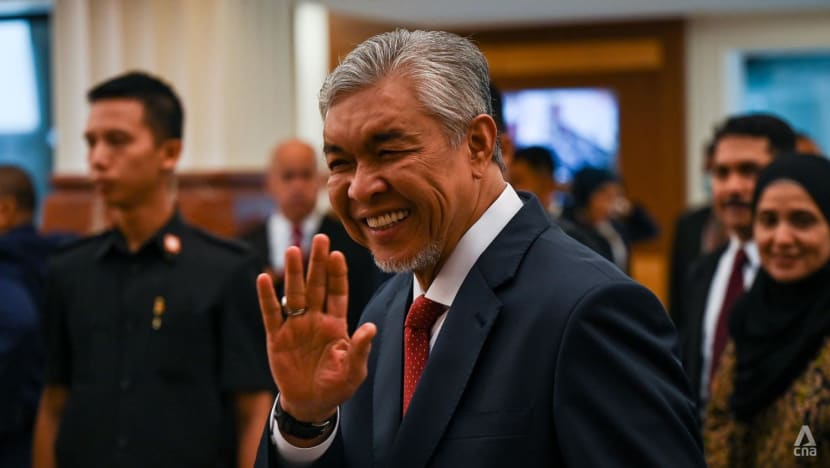analysis Asia
Ahmad Zahid consolidates grip over UMNO, but party’s rejuvenation far from assured

KUALA LUMPUR: Ahmad Zahid Hamidi has emerged as the undisputed leader of the United Malays National Organisation (UMNO) with his close allies securing top positions at the just concluded internal party polls.
However, the outcome will do little to renew UMNO’s flagging public appeal, said observers and party insiders interviewed by CNA.
Ahmad Zahid, who is both UMNO president and deputy prime minister in the Anwar Ibrahim government, consolidated his grip over the party following the victories of his close allies in the race for the three vice-president positions and the powerful 25-member supreme council.
The recent party elections, marred by controversy over an earlier decision to keep the positions of the party president and deputy president uncontested, also saw many UMNO senior figures opposed to Ahmad Zahid losing their positions as division chiefs. The contest involving 189 out of 191 UMNO divisions nation-wide was held over the weekend.
“The party is really in crisis because the elections results do not send the message that UMNO is trying to become more dynamic …it is all (Ahmad) Zahid’s people who are in key positions,” said Mr Azim Zabidi, UMNO’s former national treasurer who left the party in late 2018 citing loss of confidence in the party’s leadership. He is now a businessman but remains in close contact with his former party colleagues.
“The UMNO brand remains in trouble and the election results will make it harder to sell the party to ordinary Malaysians, especially the Malays,” added Mr Abdul Kadir Jasin, who served as media advisor to former prime minister Mahathir Mohamad.
UMNO - Malaysia’s most established political institution and for a long time considered the most favoured party for the ethnic Malays that make up more than 60 per cent of the country’s 33.6 million population - has been on the back foot because of its image as a graft tainted party.
The party, which ruled Malaysia as the anchor party of Barisan Nasional (BN) coalition since independence, lost power in May 2018 on the back of widespread public anger over the scandal at state-owned investment vehicle 1Malaysia Development Bhd (1MDB). The 1MDB scandal subsequently led to the conviction and jailing of former UMNO president and prime minister Najib Razak over corruption.
Ahmad Zahid is also facing charges of criminal breach of trust and money laundering during his tenure as home minister between 2013 and 2018. His trial is set to resume on April 10.
While UMNO’s political prestige has been severely battered in recent years, the party and Ahmad Zahid remain crucial to the unity government headed by Mr Anwar.
In the face of strong internal opposition within UMNO, Ahmad Zahid threw the party’s weight behind Mr Anwar’s Pakatan Harapan (PH) coalition, which won the most seats in the Nov 19 general election, but fell short of a majority needed to form a government. UMNO’s move led its traditional allies in the East Malaysian states of Sarawak and Sabah to join the unity government, breaking a week-long political deadlock and paving the way for Mr Anwar’s appointment as premier.
Ahmad Zahid has said that the party election results showed that UMNO’s leaders and grassroots members were clearly in favour of the unity government.
But several party leaders, who spoke on condition of anonymity, said the upbeat pronouncements by Ahmad Zahid and those loyal to him after the recent internal polls are aimed to gloss over that simmering tension in the party following the purge in late January of senior leaders who were potential challengers to the politicians in the Ahmad Zahid camp.
The party sacked 44 members, including former health minister Khairy Jamaluddin, former Selangor UMNO chief Noh Omar, and suspended four others, including former defence minister Hishammuddin Hussein.
.png?itok=Iph5n64q)
“(Ahmad) Zahid has to accept that as long as he is the party president, winning back the Malay support will be an uphill struggle,” said an UMNO division chief in the central Selangor state, adding that the decision to bar contests for the post of president and deputy president held by Ahmad Zahid and Mr Mohamad Hassan respectively had prevented any renewal to take shape in the party.
UMNO’s big test will come when elections in six states are held sometime in June or July. Key battlegrounds will be the Malay-dominated states of Terengganu, Kedah and Kelantan, where UMNO will go head on with the right-wing Parti Islam Se-Malaysia (PAS), which currently control all three state assemblies.
The other three states where UMNO’s appeal will be tested are Negeri Sembilan, Selangor and Penang, which are currently controlled by Mr Anwar’s PH.
Mr Azim, UMNO’s former treasurer, said there were already mutterings among several senior party leaders opposed to Ahmad Zahid’s leadership to boycott the upcoming state polls, a move that would prove devastating for the party. “When your own party members decide not to canvas for votes, the whole UMNO machinery will break down,” he said.
Mr Abdul Kadir, who is also the former editor-in-chief of local daily New Straits Times and has written about key political trends, said that surveys conducted by UMNO and several other independent research groups suggest that the party only secured 23 per cent of the total Malay vote during the 15th General Election. “I do not see any reason why the Malays support will return. The party has not changed,” he said.












.png?itok=NkQ47Kxm)






